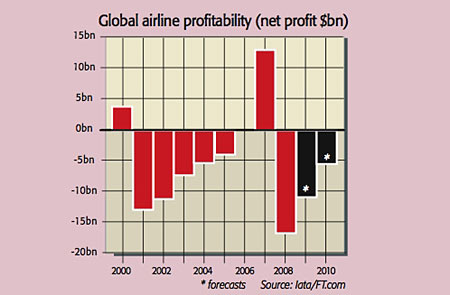
So much for the Christmas getaway. Eurostar blamed “fluffy” snow for a three-day suspension of services that affected 125,000 people, but finally ran trains again on Tuesday. National train companies, which had reported a 12.5% year-on-year jump in Christmas bookings for the first ten days of December, were also badly hit by renewed snowfalls this week, as were all of London’s airports.
That followed last week’s news that Globespan, the travel group that owns Scotland’s Flyglobespan, had gone bust. On the plus side, BA won a court injunction to stop a planned 12-day stoppage over Christmas.
What the commentators said
Over 15 airlines have gone under this year, said Philip Pank in The Times, and plenty will follow, with smaller airlines such as Flyglobespan especially endangered. The biggest airlines have managed to stay afloat by borrowing heavily on the thawing debt markets. Airlines have raised $20.5bn this year, compared to a mere $5.5bn in 2008. But “the minnows” are having trouble accessing credit, and “are still finding it hard to get a loan from the bank”.
For the industry overall, “it is a familiar hard luck story of high fuel and low yields” (revenue per passenger), said Lex in the FT. Having lost $50bn since 2000 and an estimated $11bn in 2009, global airlines will keep bleeding red ink next year. The International Air Transport Association expects a worldwide loss of $5.6bn. Passenger numbers will recover but fuel costs are still rising and high-margin business travel is lacklustre, while a glut of aircraft on the market isn’t helping either.
A downturn, along with mounting competition from budget airlines, makes it especially important for established, previously state-owned carriers to “bring 21st-century working practices to a workforce protected by a web of 20th-century industrial agreements”, said Pilita Clark in the FT. Enter BA, where the court decision has merely led to a “brief cessation of hostilities”.
A further ballot could result in industrial action at the end of January, and as long as there is a threat of strikes, BA is going to struggle to win business from crucial corporate customers, said Nomura’s Mark McVicar. So BA’s turbulence is far from over.